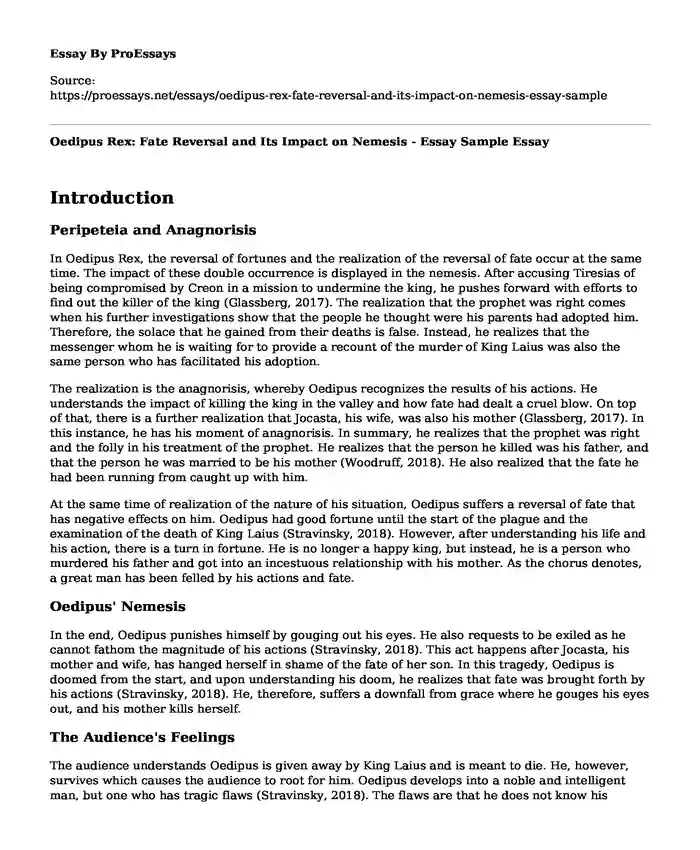Introduction
Peripeteia and Anagnorisis
In Oedipus Rex, the reversal of fortunes and the realization of the reversal of fate occur at the same time. The impact of these double occurrence is displayed in the nemesis. After accusing Tiresias of being compromised by Creon in a mission to undermine the king, he pushes forward with efforts to find out the killer of the king (Glassberg, 2017). The realization that the prophet was right comes when his further investigations show that the people he thought were his parents had adopted him. Therefore, the solace that he gained from their deaths is false. Instead, he realizes that the messenger whom he is waiting for to provide a recount of the murder of King Laius was also the same person who has facilitated his adoption.
The realization is the anagnorisis, whereby Oedipus recognizes the results of his actions. He understands the impact of killing the king in the valley and how fate had dealt a cruel blow. On top of that, there is a further realization that Jocasta, his wife, was also his mother (Glassberg, 2017). In this instance, he has his moment of anagnorisis. In summary, he realizes that the prophet was right and the folly in his treatment of the prophet. He realizes that the person he killed was his father, and that the person he was married to be his mother (Woodruff, 2018). He also realized that the fate he had been running from caught up with him.
At the same time of realization of the nature of his situation, Oedipus suffers a reversal of fate that has negative effects on him. Oedipus had good fortune until the start of the plague and the examination of the death of King Laius (Stravinsky, 2018). However, after understanding his life and his action, there is a turn in fortune. He is no longer a happy king, but instead, he is a person who murdered his father and got into an incestuous relationship with his mother. As the chorus denotes, a great man has been felled by his actions and fate.
Oedipus' Nemesis
In the end, Oedipus punishes himself by gouging out his eyes. He also requests to be exiled as he cannot fathom the magnitude of his actions (Stravinsky, 2018). This act happens after Jocasta, his mother and wife, has hanged herself in shame of the fate of her son. In this tragedy, Oedipus is doomed from the start, and upon understanding his doom, he realizes that fate was brought forth by his actions (Stravinsky, 2018). He, therefore, suffers a downfall from grace where he gouges his eyes out, and his mother kills herself.
The Audience's Feelings
The audience understands Oedipus is given away by King Laius and is meant to die. He, however, survives which causes the audience to root for him. Oedipus develops into a noble and intelligent man, but one who has tragic flaws (Stravinsky, 2018). The flaws are that he does not know his background but instead knows of the prophecy that he will kill his father and marry his mother. He is determined to avoid this fate and therefore runs away from Corinth. Fate has it that he becomes a beloved king in Thebes, married to queen Jocasta (Stravinsky, 2018). In this part, the audience fears for Oedipus as they already know that Oedipus has not escaped his fate. As they watch Oedipus coming into the realization and undergo nemesis, the audience pities him. This generation of pity and fear coupled with Oedipus having the characteristics of a tragic hero show that this story exemplifies Aristotle's definition of a tragic hero.
Conclusion
In Poetics, Aristotle explains the characteristics of a tragic hero as hamartia, hubris, peripeteia, anagnorisis, and nemesis. He also explains the impact of the hero's story as one that elicits pity and fear from the audience. Oedipus, as a character, fits the description of a tragic hero since he shows all of these characteristics. He has a tragic flaw in lacking the knowledge about himself, and he shows pride when the prophet tries to guide his decision making. He later acquires knowledge about himself, and therefore his fortunes change. His downfall is shown when his mother dies and he gorges his eyes out. Therefore, Oedipus is a tragic hero.
References
Adade-Yeboah, A., & Ahenkora, K. (2016). The tragic hero of the neo-classical revival.
Aristotle, B. (2019). The Poetics. BookRix.
Edmunds, L. (2020). Oedipus: the ancient legend and its later analogues. JHU Press.
Glassberg, R. (2017). Uses of Hamartia, Flaw, and Irony in Oedipus Tyrannus and King Lear. Philosophy and Literature, 41(1), 201-206.
Johnson, G., & Arp, T. R. (2015). Perrine's Literature: Structure, Sound & Sense. Cengage Learning.
Stravinsky, I. (2018). Oedipus Rex/The Rake's Progress. Alma Books.
Woodruff, P. (Ed.). (2018). The Oedipus plays of Sophocles: philosophical perspectives. Oxford University Press.
Cite this page
Oedipus Rex: Fate Reversal and Its Impact on Nemesis - Essay Sample. (2023, May 28). Retrieved from https://proessays.net/essays/oedipus-rex-fate-reversal-and-its-impact-on-nemesis-essay-sample
If you are the original author of this essay and no longer wish to have it published on the ProEssays website, please click below to request its removal:
- Literary Essay Sample on Sonny's Blues
- The Role of the Narrator in Harper Lee's To Kill a Mockingbird: Literary Analysis Essay
- Comparing and Contrasting The Storm and the Yellow Wallpaper
- Literary Analysis Essay on The Monkey's Paw
- Literary Analysis Essay on The Star-Spangled Banner
- Business Leaders: Role Model Duty for Ethical Practices - Research Paper
- The Benefits of Social Identity Theory for Teachers - Essay Sample







